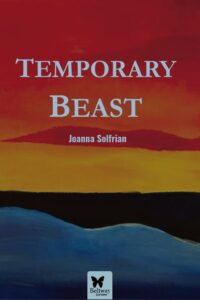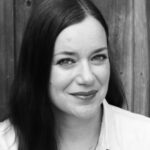Today’s special guest is poet Joanna Solfrian and we’re chatting about her new book, Temporary Beast.

Bio:
Joanna Solfrian’s first book, Visible Heavens, was chosen by Naomi Shihab Nye for the 2009 Stan and Tom Wick Poetry Prize, a national first book award. Her second collection, The Mud Room, was published by MadHat Press, followed by the chapbook The Second Perfect Number by Finishing Line Press. In 2024 Beltway Editions published the collection Temporary Beast. Her poems have appeared in The Harvard Review, Boulevard, Rattle, Margie, The Southern Review, Salamander, Pleiades, Image, and elsewhere. She is a MacDowell Fellow and a five-time Pushcart nominee. Joanna lives and works in New York City.
What do you enjoy most about writing poems?
I always read before writing (my way of paying respect), which means that when I pick up my pencil I feel as though I’m conversing with whomever I was just reading. That may sound pretentious but I mean it as a blurring of identity. In the conversation you find a sympatico feeling and then poof, you’re part them and they’re part you and you’re together in a space where linear time is irrelevant. That’s enormously comforting. Yesterday I was talking with Hafiz and last week Patrizia Cavalli. Long-dead and recently dead! Yet there we were.
Can you give us a little insight into a few of your poems – perhaps a couple of your favorites?
I’m fond of understanding things emotionally before I understand them intellectually. So the poems I love the most I’ve written quickly, with the pencil trying to keep up with the flow of the words, because they’ve tapped into some emotional slipstream unpolluted by analysis. This has only happened a couple of times with entire poems (I opened Visible Heavens with “You Among Stones,” which came to me in a coffeeshop). More often it happens with a phrase or a single word – the phrase or word will “arrive,” which is its own distinct feeling – and when that happens, I almost always keep the word or phrase, even after revisions, because it is special to me. In my latest book, Temporary Beast, there are several phrases that to my mind “make sense” emotionally, but perhaps not intellectually; for example, “For fourteen hours I bled internally, then blacked out to a hand opening the moon.” The first half of that sentence is quite clear but the second not at all, which probably means it “arrived.” Whose hand? How does one open the moon? These are intellectual questions. But if we forget about that and just feel the line, I think we get a sense of wonder and invitation, of passing into a different space because of near death. I try to leave room in my poems for phrases that make sense emotionally, because often what I revise toward — for better or worse — is intellectual sense.
What form are you inspired to write in the most? Why?
I write a lot of ghazals or ghazal-ish poems because of the appeal of separate couplets. Ghazals encourage couplets to be distinct from each other, like pearls on a strand, so there’s little need for grammatical transitions – introductory adverbial clauses, for example – anything that cues how the poem got from Point A to Point B. (After I woke, I walked to the window…) This seemingly unconnected form goes against how my brain was socialized. I was socialized to be intelligible, well-spoken, and even grammatically nurturing in my communication, in that being easy-to-understand nurtures the listener. This strikes me as a frequently female kind of socialization. More specifically to me, two more things contributed: being a minister’s daughter who learned early the art of coffee-hour chat, and also being trained as a teacher. This was time well-spent! But sometimes when I write, I just want to be spiky and weird. I want to blurt. I find that ghazals help.
What type of project are you working on next?
I have no idea, actually. I’ve yet to come up with a project first and then the poems – for me, so far, it’s always been poems poems poems, and then I spend a long while sifting through the piles for some sort of narrative arc to fit a book. I’m always most interested in the everyday divine, and I mean that as someone who grew up Christian and now leans Buddhist: there’s always consideration of what is special about being alive, how can we be present in a world with a thousand technological distractions and abject cruelty, how can we exist in a way that honors both the individual experience and also the idea that there’s really no such thing as an individual. So the next project will be…about that?

When did you first consider yourself a writer / poet?
Perhaps this goes back to the New England Puritan roots, but for me, I’m a writer in the actual moments when I’m doing the work. I don’t know if I’m a writer when I’m unloading the dishwasher.
How do you research markets for your work, perhaps as some advice for not-yet-published poets?
This is a great question. First off, I’ll be honest – it’s a slog! Published writers aren’t published just because they’re good – they’re published because they’re good and they’ve hoofed it. Also, frequently published poets aren’t rejected less, they’re rejected more, because they’re submitting constantly. So try some of the following: make a spreadsheet or join Duotrope to track submissions to journals, read Poets Market or Poets & Writers, noodle around Submittable, join social media poetry groups, ask advice from any working poet you meet, go to conferences if you can afford them, and keep in touch with anyone who helps you along the way and try to help them when you can. It’s a job in and of itself, and it favors those with disposable income and/or time on their hands. That’s not most of us, so it’s important to acknowledge the slog and chip away at it when you can.
What would you say is your interesting writing quirk?
When I really get going, my handwriting is bunk. So when I go to type up the draft, I misread words and often find that the misread word is much more interesting. I do this with Emily Dickinson’s envelope poems (you can find them free online) – I’ll “translate” her handwriting, which is abysmal, into what I think she’s saying, and I’m so wrong that I can end up using some of the lines myself.
That there is an Emily Dickinson hack.
As a child, what did you want to be when you grew up?
A teacher. And I do teach, and I love teaching. A college student said to me once, “You’re one of those people who’s happy all the time,” and I thought oh my gosh no, I’m middle-aged and people keep dying! I’ve got two little kids and can’t sleep! I wear so many hats that I never feel good in any of them! etc. But he meant it kindly, so I just said, “It is true that I’m always happy to see you all, because we get to be in a room together and talk poetry.” Honestly, it doesn’t even have to be poetry. I’ve also taught math, which is enormously comforting. But that’s a different interview.
Anything additional you want to share with the readers?
I just love that they’re making time to read your blog, so I will share my thanks.
